 The annual show was smaller and less busy than those years ago. But the gem and mineral dealers had their usual variety of rough and cut gemstones at their stands.
The annual show was smaller and less busy than those years ago. But the gem and mineral dealers had their usual variety of rough and cut gemstones at their stands. The Quarterly Newsletter of the Canadian Institute of Gemmology (C.I.G.)
After a hot summer we are looking forward to the cooler days of the fall.
I spent 3 weeks in Brazil travelling to the historic town of Diamantina in the north of Minas Gerais and after passing through Serro - another UNESCO designated colonial town - and Governador Valadares I ended up in Teófilo Otoni attending FIPP 2010.
All the hotels in town were full for the first 2 days but actual business at the Fair was still recovering from last year with several of the bigger local gem dealers missing. However, there were interesting things to see such as splendid Imperial Topaz from Maracujá and opal from Piauí in intense yellow, orange, green and blue colours. More below.
Diamantina, the most remote of the colonial cities in the north of the State capital is reached easily from Belo Horizonte by bus in 4 to 5 hours. This centre of a once active diamond industry has excellent colonial buildings and after Serro perhaps the least spoiled with carved overhanging roofs and brackets.
This friendly, beautiful town is in the deep interior, amid barren mountains and one can feel it: at night the temperature can drop below 10 degrees and during day it can get hot reaching 30 degrees C and much more in summer. I stayed at the "Pousada Capistrana"(50 BRL or US$ 30 including breakfast) - a spotless place in the old town.
I also visited the nearby state park and walked along the "Caminho dos Escravos", the old paved road built by slaves between the now abandoned mining area on Rio Jequinhonha and Diamantina; we included a visit to Biribiri, a pretty village with a well-preserved church about 12 km away.




But the highlight of my visit was the "Garimpo" tour. As there were few tourists "The Garimpo" picked me up and with several Brazilians we went to a particular site where one could experience "diamond fever" of the olden days. Watch how diamonds were mined nearby:
It is possible to travel from Diamantina to Teofilo Otoni via Serro (change bus) - Guanhães ( 2 hours overlay good for lunch) - Governador Valadares (3 hours); unless you want to visit Araçuaí and stay overnight there (it has a nice hotel now) the road is still partially unpaved and slow. I spent 2 days in Serro at the "Pousada do Queijo " (35 BRL or US$ 20 including breakfast); "Serro Cheese" is famous for its handmade technique. Another beautiful place 25 km away on a dirt road is "Milho Verde"; I think I could easily spend there a few weeks.
The road to Governador Valadares passes through Guanhães and is paved but the area is mountainous with many valleys. After attending FIPP 2010 I returned to Governador and boarded the daily train to Vitória, Espíritu Santo - one of the three Brazilian capitals built on islands. The train ride is spectacular and cheaper (30 BRL or US$ 17) and faster than the bus (6 hours).
As I needed some beach time I continued to nearby Guarapari - famous for its radioactive sands. I stayed coincidentally at the Hotel Diamantina (80 BRL or US$ 46 including breakfast) The annual show was smaller and less busy than those years ago. But the gem and mineral dealers had their usual variety of rough and cut gemstones at their stands.
The annual show was smaller and less busy than those years ago. But the gem and mineral dealers had their usual variety of rough and cut gemstones at their stands.
My first visit was to the booth of Mineração Maracujá with rough and beautiful faceted Imperial Topaz on display; the mine owner Alexandre Valente told me that all his material is untreated.
The "tutti frutti" tourmaline assembly (see below) was something else and commanded a price of $ 20,000.
There was a lot of material from mining fields in the Araçuaí area. One dealer had a large supply of opal from Buriti dos Montes, Piauí in almost any colour; the intense yellow colour opals (these "fire opals" range from yellow to red in colour) caught my eye and I wonder if this is the "real thing" as it comes out of the ground.
Another dealer had large pieces of ruby from Vitória da Conquista, Bahia but it was more suited for carvings; similar for emeralds coming from an area between Jacobina and Campo Formoso. There were a few superb Paraiba tourmalines to be had; the prices were between $ 2 and 3,000 but the dealer was not flexible.
I also had the opportunity to meet my friend Dr. Juergen Schnellrath, F.G.G. from CETEM who is also a member of the C.I.G. Advisory Board. I spent 2 days with him and colleagues at the on-site "laboratorio"; we had many people, both dealers and buyers drop by to have their gems checked.
Without an immersion scope our work would have been almost impossible; I also learnt efficient ways of measuring the SG of all kinds of materials.
Even glass filled ruby was available in both rough and cut stones selling for US$ 7 - 10 per ct. I purchased a stone which appears to be an improved composite bought by the dealer in Thailand a few months ago; see below.




Here a brief video from FIPP 2010:
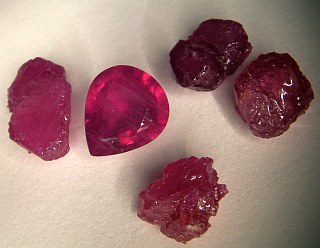

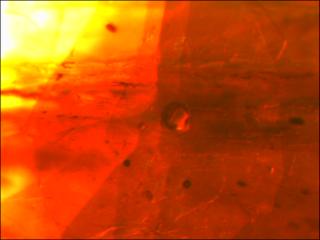
During FIPP 2010 in Teofilo Otoni I came across the above lead-glass filled rubies. Not until we immersed the pear shaped cut gemstone and inspected it under the microscope we saw some gas bubbles. The stone also showed anomalous BR under crossed polarizers. It appeared to be a new type showing colour zoning and the colour was quite attractive. The dealer told us that he purchased them in Thailand 5 months ago. He was selling the rough for $ 6/ct and the cut stone for $ 10/ct.
 A new book with superb photography "Minerals and Precious Stones of Brazil" by Carlos Cornejo and Andrea Bartorelli was introduced by the authors (Portuguese version) during FIPP 2010. It contains over 1,000 images and sections for each gemstone with in-depth text on history, mineralogy, mining, people etc. I bought the English version in Rio de Janeiro (price US$ 87.00). More info here.
A new book with superb photography "Minerals and Precious Stones of Brazil" by Carlos Cornejo and Andrea Bartorelli was introduced by the authors (Portuguese version) during FIPP 2010. It contains over 1,000 images and sections for each gemstone with in-depth text on history, mineralogy, mining, people etc. I bought the English version in Rio de Janeiro (price US$ 87.00). More info here. .
.
For gem lovers and mineral collectors this is one of the best book I have seen for some time. Highly recommended.
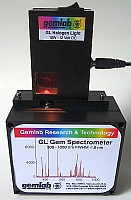 The GL Gem Spectrometer system has finally been released.
The GL Gem Spectrometer system has finally been released.
To learn more about how this instrument works download "How to get started"  - quick instructions, 291 KB, Acrobat Reader needed.
- quick instructions, 291 KB, Acrobat Reader needed.
For updated technical data and description go to the GLGemSpec webpage.
A database with spectra of important gemstones is available in the user section and will be shared and updated constantly. A BBS forum is also available to discuss and exchange experiences with other users. As all GLGemSpec units are custom made a backlog of orders exists at the moment; but all orders will be filled by next week.
Here is the comment of a satisfied user: "I utilize my GLGemSpec to assist me in identifying and verifying gemstones from suppliers. The accuracy is better than the human eye in observing the spectral data. When there is something that doesn't appear as expected during testing I scrutinize the data more closely. Having the advantage of covering a large spectrum the GLGemSpec allows me to process more data about the products prior to sale or resale and assists in keeping records of those items." R. Kreinbrink, Owner, SOC Jewelry
 AGTA GemFair Tucson 2011 - February 1-6, 2011
AGTA GemFair Tucson 2011 - February 1-6, 2011 Get ready for the big event and visit us at booth # 31 on the Galleria Level
We will have the new GL Gem Spectrometer on display. I also will be giving a workshop and presentation to be announced later.
 The Canadian Institute of Gemmology is now a member of the Jewelers Ethics Association
The Canadian Institute of Gemmology is now a member of the Jewelers Ethics Association The JEA is an association open to all members of the trade and consumers. JEA provides its members with information, education, mediation and support to increase confidence in the products they buy and sell.
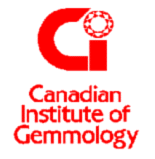 Vancouver C.I.G. Courses and Workshops - Fall 2010/Winter 2011
Vancouver C.I.G. Courses and Workshops - Fall 2010/Winter 2011 The Canadian Institute of Gemmology is offering a self-guided study program for students who have completed a gemmology program with another institution.
The Canadian Institute of Gemmology is offering a self-guided study program for students who have completed a gemmology program with another institution.
Upon successful completion of the AG-PDP graduates are entitled to use the international recognized professional Accredited Gemmologist (C.I.G.)® designation - a registeredcertification mark. ![]()
Entrance requirement: "Fine Jewellery Expert (C.I.G.)", F.G.A. or equivalent from other international institutions; foreign candidates may apply but must enter Canada under a visitor's visa (no student visas available). If credentials were obtained before 2001 a practical entrance test must be passed.
Course credits required: all GEM 200-level courses such as GEM 210 Diamond Grading, GEM 220 Advanced Gemmology, GEM 230 Gem Colour Grading, GEM 250 Gem Identification II; for more info go to Advanced (GEM 200-level) Courses.
GEM 250 Gem Identification II: For this course it is recommended that students have basic gem equipment at their disposal to complete individual projects at home or at their work place; students will also learn the use of UV- VIS - NIR spectrometers. There will be a four-day practical workshop at the end of the program; the last day will be exam-day for both written and practical exam.
GEM 250 Update Course: Tue - Fri, Nov. 16 - 19, 10a.m. - 4:30 p.m. (midweek class), Richmond, B.C., Airport Hotel
GLGemSpec Update Workshop - advanced gem identification for GLGemSpec users: Fri, Nov 19, 10 a.m. - 4:30 p.m., Richmond, B.C., Airport Hotel

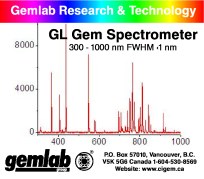 Our new USB portable GL Gem SpectrometerTM (GLGemSpec 300 - 1000 nm FWHM <1.00 nm) with customized software is available now.
Our new USB portable GL Gem SpectrometerTM (GLGemSpec 300 - 1000 nm FWHM <1.00 nm) with customized software is available now.
The prize for abasic setup including fiber probe, GL Tungsten Halogen Light Source (GLHalogen 10W) and soft-ware is under $ 1,800. See for more information with specs and pricing.
Microscope camera with Dell Mini 9" netbook
To obtain certification as an "Accredited Gemmologist (C.I.G.)®" a scientific paper has to be submitted within 6 months of completion of the A.G. (C.I.G.) diploma program. See course outline or View/Download program brochure ![]() 404k (Acrobat Reader or plug-in needed (right-click for direct View/Download to your computer). View/Download Application Form
404k (Acrobat Reader or plug-in needed (right-click for direct View/Download to your computer). View/Download Application Form ![]() 232k, Acrobat Reader or plug-in needed. If you have any further questions about the AG-PDP program please call (604) 530-8569.
232k, Acrobat Reader or plug-in needed. If you have any further questions about the AG-PDP program please call (604) 530-8569.
Gem Identification ($ 995 includes all study materials, access to fully equipped workstation and exam fees (no HST)

 In this intensive lab course you will use the full range of gem testing equipment necessary to identify natural, imitation and synthetic gemstones. In 10 lab assignments students will identify between 80 and 100 gemstones including synthetic stones. Each student has access to a fully equipped work-station with stereo-microscope, polariscope, refractometer, spectroscope and other instruments.
In this intensive lab course you will use the full range of gem testing equipment necessary to identify natural, imitation and synthetic gemstones. In 10 lab assignments students will identify between 80 and 100 gemstones including synthetic stones. Each student has access to a fully equipped work-station with stereo-microscope, polariscope, refractometer, spectroscope and other instruments.
Prerequisite: Course GEM 110 and 120
To register please call (604) 530-8569
This course is also available by home study (for Canadian residents only): student must have access to basic gem identification tools such as refractometer, polariscope, spectroscope, etc. Study stone sets will be sent by mail and guidance is available through ![]() Skype video tutorial with an instructor. More info.
Skype video tutorial with an instructor. More info.
Diamond Grading ($ 995 includes home study lessons (must be completed prior to practical class), grading projects with actual diamonds, study materials and exam fees (no HST) but does not include the textbook "Diamond Grading ABC: Handbook of Diamond Grading" by Pagel Theisen, 2007 (price $ 80)

 In ten (10) assignments you learn the basic knowledge to buy, sell and evaluate diamonds effectively. In five (5) practical sessions you grade diamonds for clarity, colour and cut (according to GIA and European grading standards) including performance and device based approaches such as AGS (American Gem Society) ASET, Hearts & Arrows (Ideal Scope), Cut Advisor and others. Special procedures for assessing the quality of mounted diamonds will be shown.
In ten (10) assignments you learn the basic knowledge to buy, sell and evaluate diamonds effectively. In five (5) practical sessions you grade diamonds for clarity, colour and cut (according to GIA and European grading standards) including performance and device based approaches such as AGS (American Gem Society) ASET, Hearts & Arrows (Ideal Scope), Cut Advisor and others. Special procedures for assessing the quality of mounted diamonds will be shown.
Fee: $ 995 includes home study lessons (must be completed prior to practical class), grading projects with actual diamonds, study materials and exam fee (no HST) but does not include the textbook "Diamond Grading ABC: Handbook of Diamond Grading" by Pagel Theisen, 2007 (price $ 80)
Prerequisite: Course GEM 130 Introduction to Diamonds
To register please call (604) 530-8569
Diamond Expert (C.I.G) Certificate
 To earn the "Diamond Expert" designation students have to complete Course GEM 130 Diamonds and GEM 210 Diamond Grading with a passing mark of at least 85% in their course work. An annual license fee of $ 100 and upgrade courses are required to maintain their status. Please refer to the course brochure.
To earn the "Diamond Expert" designation students have to complete Course GEM 130 Diamonds and GEM 210 Diamond Grading with a passing mark of at least 85% in their course work. An annual license fee of $ 100 and upgrade courses are required to maintain their status. Please refer to the course brochure.
View/Download program outline ![]() 344k (Acrobat Reader or plug-in needed (right-click for direct View/Download to your computer).
344k (Acrobat Reader or plug-in needed (right-click for direct View/Download to your computer).
Visit![]() Books and Instruments.
Books and Instruments.
The name and logo GEMLAB GROUP is a registered trade mark (Registration # TMA407372 with the Canadian Intellectual Property Office.
Past issues of C.I.Gem News: Click on the edition you want to read: ![]() Summer 2009
- Fall 2009
- Winter 2010 -Spring 2010 - Summer 2010. The next newsletter will be published December 21, 2010.
Summer 2009
- Fall 2009
- Winter 2010 -Spring 2010 - Summer 2010. The next newsletter will be published December 21, 2010.
To subscribe other interested people to CIGem News send an email to CIGem News
We will never use our subscriber e-mail addresses for anything but our newsletter. To UNSUBSCRIBE to our newsletter, click HERE
Unless indicated otherwise images (c)2010 J. Wolf Kuehn and Canadian Institute of Gemmology. Users may download images for their own private, non-commercial use.
The articles in CIGem News express the opinions of the editor and do not necessarily reflect those of the Canadian Institute of Gemmology (C.I.G.). The included links are provided for educational purposes. Copyright and content responsibility remains with the linked organization and do not represent any endorsement by the author. The designation ACCREDITED GEMMOLOGIST (C.I.G.)® diploma is a registered certification mark (see Industry Canada, Canadian Intellectual Property Office) and requires a user license for business use.